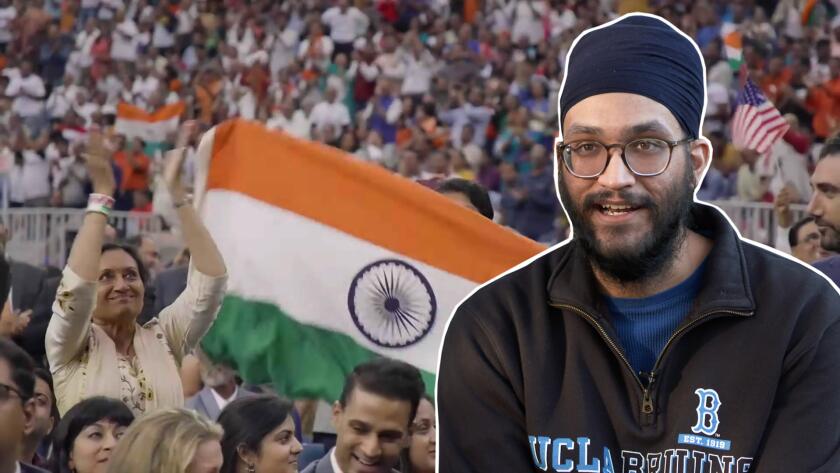Indian Americans’ votes and dollars are increasingly coveted in presidential campaigns
- Share via
- Share via
The day after Democratic presidential nominee Joe Biden named Sen. Kamala Harris of California as his running mate, Mona Mangat donated to his campaign.
“I was just inspired. I think she’s a perfect candidate, and her qualifications are impeccable, and she adds a lot to the ticket,” said Mangat, 47, a St. Petersburg, Fla., physician who has a daughter who hopes to become an attorney, like Harris. “Hearing Kamala speak is just very inspiring to my daughter.”
Mangat is part of an increasingly powerful force in American politics: Indian American voters. Though their numbers lag those of Black and Latino voters, they are a fast-growing bloc in battleground states and a key source of campaign cash.
Candidates are paying attention. Biden and Harris held a virtual South Asian block party this month that featured actress Mindy Kaling, comedian Aasif Mandvi and former U.S. attorney Preet Bharara, among other desis (as South Asians living abroad often refer to themselves).
“According to Trump, my wife has a preexisting condition: She’s married to a Muslim,” Mandvi joked at the fundraiser, which 1,300 people attended.
Indian Americans overwhelmingly vote Democratic, but experts say the Trump administration has worked hard to create inroads for Republicans, notably through foreign policy. Both campaigns have repeatedly focused on the group, a recognition of its growing political clout in turns of voter participation, fundraising and running for office, said Karthick Ramakrishnan, a UC Riverside political science professor who studies Asian American voters.
“What’s remarkable is if you look at all Asian American groups, Indian Americans are among those most recently arrived. For a group to get activated so quickly, electorally speaking, is remarkable,” he said, something he partly attributes to a high level of proficiency in English and prior experience participating in a democracy. “And then they have resources, so they can get involved.”
Indian Americans are the wealthiest immigrant group in the United States. They have given $5.4 million to Biden and his allies and $3 million to President Trump and his backers, according to a Los Angeles Times analysis of fundraising disclosures filed with the Federal Election Commission for the 2020 presidential campaign.
Indian Americans donated more than $1.2 million to the Biden campaign in the 20 days after the former vice president selected Harris as his running mate. She is the first Indian American and the first Black woman to be on a major party ticket.
The increased attention to the voting bloc comes as the community has become increasingly active in electoral politics, notably in key states. Nearly 2 million Indian Americans are eligible to vote, with concentrations in battleground states such as Pennsylvania, Texas, Florida and Michigan.
In 2016, exit polls showed that 77% of Indian American voters chose Democratic nominee Hillary Clinton; a post-election survey found that 16% supported Trump. Polling indicates that more are planning to vote for him this year. The Indian American Attitudes Survey conducted in September by YouGov found that 22% plan to vote for Trump; the 2020 Asian American Voter Survey the same month found that 28% plan to vote for him.
“He did everything he promised he would do, so I know I can trust him. Also, he brought the economy to one of the best stages ever in my business career,” said Ashwin Ramrakha Kalia, a Grapevine, Texas, resident who makes a recurring $100 monthly donation to Trump.
“I like his policy of keeping America first. I think the world has taken advantage of the USA for a very long time,” said Kalia, president of Chaparral Technologies, a custom metals manufacturing firm in Fort Worth, who immigrated to the United States from India in 1978 on a merit-based visa, as he believes all immigrants should.
Trump has long courted Indian Americans, notably highlighting his close ties with India’s Hindu nationalist prime minister, Narendra Modi. In 2019, Modi visited Houston for a “Howdy, Modi” rally attended by 50,000; a few months later, the president attended a “Namaste, Trump” rally at a cricket stadium in India, attended by more than 100,000.
This year, Trump’s campaign circulated a video of his visit to the nation, with adoring crowds greeting the president, who says, “America loves India. America respects India, and America will always be a faithful and loyal friend to the Indian people.”
Trump supporters have argued that Democrats are not supportive of Indian policy, particularly in the disputed territory of Kashmir.
The Modi administration has cracked down on the Indian-administered part of the territory — the nation’s only majority Muslim region. His government last year revoked a law that granted the area limited autonomy, arrested Kashmiri political leaders and severely restricted Internet service. The crackdown has increased tensions with neighboring Pakistan — which also claims Kashmir.
Trump has not rebuked India over the clampdown in Kashmir; the Biden campaign has urged Modi’s government to retreat from its actions in the region.
“In Kashmir, the Indian government should take all necessary steps to restore rights for all the people of Kashmir. Restrictions on dissent, such as preventing peaceful protests or shutting or slowing down the Internet, weaken democracy,” according to Biden’s website, which also speaks out about a new Indian law that human rights groups fear will be used to deny citizenship to Muslims. “These measures are inconsistent with the country’s long tradition of secularism and with sustaining a multi-ethnic and multi-religious democracy.”
That has resulted in fears among some Hindu nationalists that a Biden administration would be hostile to their interests and would provide greater support to Pakistan; one inflammatory cartoon making the rounds on the Internet portrays Biden and Harris gleefully holding hands with Pakistan’s prime minister near Pakistani soldiers standing atop a pile of Hindu corpses.
Trump has named Indian Americans to top posts, most notably former South Carolina Gov. Nikki Haley as the United States ambassador to the United Nations. Haley spoke at the Republican National Convention of her upbringing in the South as the daughter of Indian immigrants. “My father wore a turban. My mother wore a sari,” she said. “I was a brown girl in a Black and white world.”
A few days earlier, Harris spoke at the Democratic National Convention about her upbringing and her family, including her “chittis.” The Tamil word of endearment literally means the younger sisters of her late mother — a pivotal force in Harris’ life whom she frequently talks about on the campaign trail.
“She came here from India at age 19 to pursue her dream of curing cancer,” Harris said of her mother as she accepted the Democratic vice presidential nomination. “She made it look easy, though I know it never was. My mother instilled in my sister, Maya, and me the values that would chart the course of our lives.”
Harris courted Indian American voters during her own presidential run, including a memorable video of her making the South Indian dish masala dosa — a crepe made with fermented rice-and-lentil batter, filled with spiced potatoes — with Kaling. The Biden campaign released another video of the pair Monday, with Kaling saying the one “politician-y” thing she had seen Harris do was pretend that her dosas tasted good. The pair then spoke about their late mothers and the importance of early voting.

Biden also has a long relationship with Indian American voters, though he has made gaffes — notably telling an Indian American man in 2008 while talking about the community’s growth in Delaware: “You cannot go to a 7-Eleven or a Dunkin’ Donuts unless you have a slight Indian accent. I’m not joking.”
But that moment is largely overshadowed by his efforts to strengthen the U.S.-India relationship, including fighting as a senator for a nuclear deal, as well as his policies on issues such as creating a pathway to citizenship for those in the country illegally, building on the Affordable Care Act and opposing the restrictions the Trump administration has placed on H1B visas for highly skilled workers.
Surveys show that Indian American voters place far greater importance on issues such as racial discrimination, education and access to healthcare than on American foreign policy toward India.
Biden’s supporters recently put out a video based on the 2001 Bollywood movie “Lagaan,” which was nominated for an Academy Award. “Chale Chalo, Chale Chalo, Biden ko Vote do, Biden ki Jeet Ho, Unki Haar Haan,” the video says, which translates roughly as “Come on, go on, vote for Biden, Biden wins, their defeat, yes.”
The former vice president has also weighed in. In an op-ed last week in the newspaper India-West, Biden recalled the Diwali reception he held in 2016 at the vice president’s residence: “In the shadow of a devastating and dark election, we gathered together for the festival of lights and new beginnings.” He also wrote of his and Harris’ policy plans and urged readers to vote.
“The Indian American electorate of nearly 2 million voters is a powerful force that can make all the difference from North Carolina and Virginia to Pennsylvania and Michigan to Georgia and Texas and across the country,” Biden wrote. “But only if you vote.”
Times staff writer Maloy Moore contributed to this report.
More to Read
Get the L.A. Times Politics newsletter
Deeply reported insights into legislation, politics and policy from Sacramento, Washington and beyond. In your inbox twice per week.
You may occasionally receive promotional content from the Los Angeles Times.












